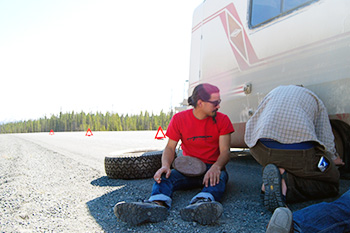 Here’s an alarming fact: 56 percent of young Americans are living paycheck to paycheck. Even worse, over half of Americans have more debt than emergency savings. That’s no way to live. Just a little sacrifice now can help you keep your head above water. So what’s stopping you?
Here’s an alarming fact: 56 percent of young Americans are living paycheck to paycheck. Even worse, over half of Americans have more debt than emergency savings. That’s no way to live. Just a little sacrifice now can help you keep your head above water. So what’s stopping you?
Why Emergency Savings Aren’t Optional
“If you don’t have a rainy day account of some kind and the rain comes down, you get wet,” says Ellie Kay, author of Lean Body, Fat Wallet. A concrete example? You unexpectedly have to replace the tires on your car for $400, which will cost you an extra $114.68 in interest if you make the minimum monthly payments on your credit card at 18 percent.
More than just money, however, a lack of emergency savings can lead to serious health consequences associated with money-related stress. Unsurprisingly, it’s now a documented fact that having enough money impacts your happiness and quality of life. In a worst-case scenario, not having emergency savings can land you back living with your parents.
Yikes. Here’s how to avoid that.
You’re Not Automatically Paying Yourself First
It’s tried and true advice: pay yourself first. Kay advises consumers to set up automatic paycheck deductions that go straight to savings. “People think that if they put money in savings it won’t be there when they need it,” she says. “But you can always take out the money later.”
Andy Ramos, Senior Vice President of Member Experience with Redwood Credit Union notes many young people simply haven’t made a habit of saving. “They think setting up some kind of automatic savings is going to be difficult,” he says. “It’s actually very easy to automate the process of saving.”
It might mean less money for new jeans or a night at the bar this week, but when you need it, you’ll be glad it’s there.
You’re Bad at Delaying Gratification
Kay points out that young people are good at rationalizing purchases they know they can’t afford. Still, Kay believes you can have it all, just not all at once.To that end, she encourages people to put a “splurge account” in their budget.
Separate from your emergency savings, this creates a monthly budget for splurging within your means. You won’t be able to go on vacation in a month, but you can with six months or a year of splurge savings.
Budgeting for what your grandmother called “mad money” means you can splurge a little now or a lot later. Either way, you won’t be cutting into your emergency savings, while still saving for fun experiences down the line.
You’ll “Do It Later”
“The younger a person is, the more immortal they feel,” says Ramos.” This leads to younger Americans feeling like they can always start saving “later.” But “later” never seems to come. Sound familiar? But while you’re planning for later, life sneaks up on you.
Kay says to start saving today, if only because it’s so easy. “Fill out direct deposit paperwork to allot money to go directly into a savings account,” she says. Self-employed people can set up automatic deductions through their credit union.
You Don’t Have Any Concrete Savings Goals
“A lot of times the trouble with people who aren’t saving is that they have no goals,” says Kay. Modest goals like moving out of your parents house at 22, buying a car at 25, and saving for a house at 30 can catalyze a more serious attitude toward saving. “If you aim for nothing, you’ll hit it every time.”
Ramos counsels clients to save from their paycheck regularly, while also creating milestones to keep you invested in the process of saving. “It’s important to have goals. You want to invest in them and prepare for them.” Skipping a weekend with your friends might sting, but it will sting a lot less when you buy your car in cash.
You Don’t Have A Budget
Tracking your spending is often the first step toward creating a budget. Kay is a big fan of Mint, a free app that tracks your budget in real time. Ramos urges consumers to take advantage of free education through their financial institution — an increasingly common perk, especially at credit unions.
Create a budget. Include spending on “fun” things. Automate your savings. Start preparing yourself today so the next time there’s an emergency you won’t get left out in the rain — or seeking shelter with mom and dad.






